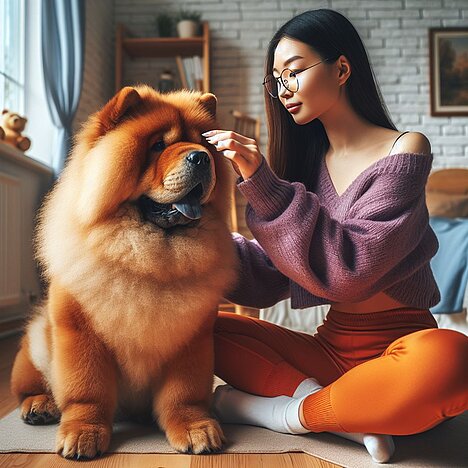Entropion

Entropion is an eye condition that can occur in dogs. The edge of the eyelid rolls inwards and rubs against the cornea. This can lead to pain, inflammation and impaired vision. In this article, you will learn about the causes, symptoms and treatment options for entropion and how you can help your dog.
What are the causes of entropion?
Entropion can have various causes. Some dogs have a genetic predisposition to this condition, especially breeds with short muzzles or a lot of skin on the face, such as Shar-Pei, Chow Chow or Mastiff. In these dogs, the eyelid is often too tight or too loose and can easily curl up.
Other possible causes are injuries, infections or allergies, which can lead to swelling or scarring of the eyelid. Age can also play a role, as the tissue slackens over time and the eyelid gives way.
What are the symptoms of entropion?
The symptoms of entropion are usually clearly visible. You can recognize that your dog is suffering from entropion if you observe the following:
- The eyelid is rolled inwards and partially or completely covers the cornea.
- The eye is red, watery or ulcerated.
- The dog blinks frequently, squints its eyes or rubs its eyes with its paws.
- The dog shows signs of pain or discomfort, such as loss of appetite, restlessness or aggression.
How is entropion diagnosed?
If you suspect that your dog is suffering from entropion, you should take him to the vet as soon as possible. The vet will examine your dog's eye thoroughly and determine whether it is entropion or another condition. They will also check to see if the cornea is injured or damaged.
To confirm the diagnosis, the vet can perform a simple test. They will gently pull your dog's eyelid outwards and observe whether or not it rolls back in. If it rolls back in, it is probably entropion.
How is entropion treated?
The treatment of entropion depends on the severity and cause of the condition. In some cases, drug therapy may be sufficient to alleviate the symptoms. The vet may prescribe eye drops or ointments to reduce inflammation and protect the cornea. They may also give you painkillers or antibiotics if necessary.
In other cases, surgical correction of the eyelid is necessary. This involves removing or tightening excess skin to bring the eyelid into the correct position. The operation is usually a simple procedure that can be performed under local anesthesia. The dog must wear a protective collar afterwards to prevent it from scratching or licking its eye.
How can you help your dog?
If your dog is suffering from entropion, you can help him by doing the following:
- Keep his eye clean and dry. Use a soft cloth or sterile compress and lukewarm water. Avoid using soap or other irritating substances.
- Follow your vet's instructions regarding medication or post-operative care. Give your dog the right dose at the right time and make sure he wears the protective collar.
- Watch his eye for signs of complications, such as worsening symptoms, increased swelling or bleeding, or a change in the color or odor of the eye discharge. If you notice anything unusual, contact your vet immediately.
- Show your dog lots of love and patience. Entropion can be very uncomfortable for your dog, so be understanding and supportive. Give him lots of attention and cuddles and try to distract him from his eye.
Entropion is a serious eye condition that can occur in dogs. It can lead to pain, inflammation and visual impairment. Treatment depends on the cause and severity of the condition, but can be successful in many cases. If you want to help your dog, you should keep his eye clean, use the medication correctly and take him to the vet if necessary. With your care and love, you can help your dog live a healthy and happy life.
The authors assume that a veterinarian should be consulted if an animal is ill and that medication should only be taken after consultation with a doctor or pharmacist. Only an individual examination can lead to a diagnosis and treatment decision.
We help you find the nearest vet → This way